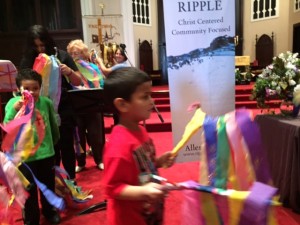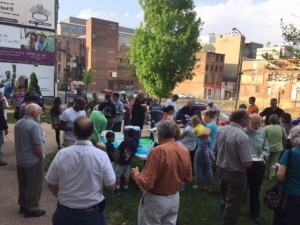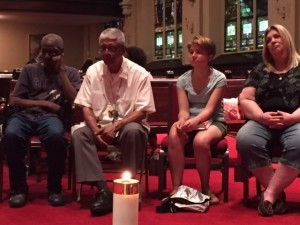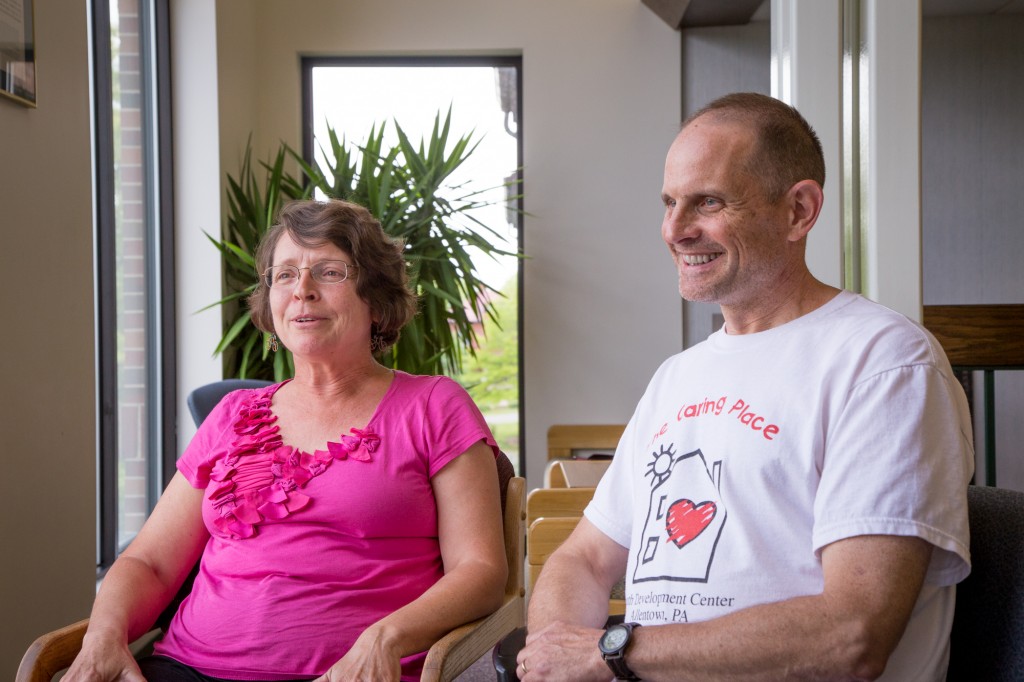Imagine hearing the call to urban ministry, selling your lovingly renovated suburban farmhouse where you’ve lived for 25 years, and moving into an inner city apartment.
Imagine your congregation shape-shifting into and out of spaces as it grows – a good problem – but one with its own stressors.
Imagine one of your most fervent members being a man who lives under a bridge and struggles with addiction, whom you affectionately call “Tony the Evangelist,” because he hands out the church’s business cards among his homeless friends. “You gotta come and see,” he said, of Ripple Church. And they do.
Think about how it would feel to get a phone call in March from the police, who found one of those business cards in Tony’s pocket. He had been sleeping in a garbage dumpster and was crushed by a compactor early one morning, later dying from his injuries.
“Three hundred people turned out for his funeral, and we’re still grieving,” says Tom Albright, an Eastern Mennonite Seminary graduate who founded Allentown’s Ripple Church, a congregation in the Franconia Conference of Mennonite Church USA, with his wife Carolyn.
Imagine the uncertainty, the conviction, the joy, the challenge of such work.

Reviving Spirits and Hearts
Oasis. The name implies a place where thirsts are quenched and spirits revived. Each summer for two weeks, Eastern Mennonite Seminary opens its doors and classrooms to pastors and church leaders seeking respite and soul care. The program is part of the Summer Institute of Spiritual Formation (SISF), which provides training and optional certification for spiritual directors.
Director Linda Alley calls both programs “a spiritual camp for adults, a truly life-giving program for many pastors who need space and support in processing their work and their own spiritual direction.”
For Tom and Carolyn Albright, Oasis was a welcome opportunity to worship, to meet with spiritual directors, to enjoy the stimulation and engagement of classes without the obligation to meet credit requirements. The week at EMS was, in some way, an anniversary celebration of their past milestones: the Albrights both earned certificates of spiritual formation by attending SISF every summer from 2007 to 2009; additionally, Tom and Carolyn both earned certificates of ministry studies in 2013 and 2015 respectively.
Ripple Church: an ‘experiment’ in urban ministry

Those years at the seminary, beginning in 2007, also mark a time of transformation, uprooting and calling when the SISF environment of openness and questioning helped the Albrights discern their future.
The couple started Ripple Church in 2006 in their home community of Whitehall and after three years, moved with the church into the heart of Allentown – with more than 118,000 residents and a 42 percent Hispanic population, Pennsylvania’s third-largest and first Hispanic-majority city.
One reason the couple decided to live in urban ministry was a question posed by a regular attendee: “Why,” she asked, “are churches leaving the city? Why don’t you bring Ripple into the city?”
When they did, hosting weekday meetings at a community center in Allentown called The Caring Place, “I felt the call,” Tom said, “and Carolyn did too.” In 2009, with the blessing of their adult children, they embarked on what was at first a conference-related ministry of the Franconia Conference. After multiple moves, Ripple lives comfortably at St. Paul’s Lutheran Church in the downtown area.
Five pastors, all of whom are bi-vocational, work with Ripple’s congregation of more than 100: Carolyn, a bilingual fourth-grade teacher; Tom, a career counselor for special needs youth at Freedom High School; Angela Moyer, MDiv ’12, an occupational therapist; Danilo Sanchez, MDiv ’13, who also works for Mennonite Central Committee; and Ben Walter, a Biblical Theological Institute graduate who also is a house painter.
Worship in circles joins hearts, community

Tom calls Ripple a “restorative church,” a concept that he fine-tuned while earning a second master’s degree at Bethlehem’s International Institute for Restorative Practices. Speaking at the IIRP World Conference in 2013, Tom explained that traditional churches measure success by how many people attend and how much money is being brought in. “In a restorative church, though, we measure by relationships and ripples. How are relationships forming and how is that spreading out into the community? It’s a whole different way of living, working and worshiping in the city.”
The church meets in three smaller groups, with pastors sharing leadership in a rotation pattern – an innovative idea that developed because of lack of space, but eventually has become the congregation’s much-beloved format. The Church of the Tables, the Church of the Circles, and the Church of the Sidewalk each have their own unique feel. Worship services begin with a simple and short message, and then move into discussion.
The Church of the Sidewalk, held on the steps in a semi-covered porch, was immediately popular with smokers and people who wanted to bring their dogs. Hosting worship here provided a welcoming symbolic place, because, as Tom says, “the doors of church are incredibly hard to get people through.” Those who worshiped at this church were a hardy and loyal bunch. When winter came to Allentown, the group turned down offers to come inside. Ripple Church bought pole heaters and blankets and carpet squares to sit on, and the Church of the Sidewalk missed only one Sunday through the winter because of snow.
During their week of Oasis, the Albrights enjoyed bike rides in the country, daily worship at Martin Chapel, visits and dinner with friends, and mentoring by spiritual directors. Carolyn took a class in sustaining practices in congregational worship, “good because we are meeting so many different needs,” she said, adding that the church ministers to many on “the margins,” such as the homeless, non-native speakers, people struggling with addiction, and single parents.
The Albrights returned to Allentown refreshed and thankful. “The spiritual direction feeds my soul,” Tom said. “Sometimes you just need someone to listen to what you’re thinking and what you’re going through. We know that self-care and discernment are important parts of pastoring and this place has been formative for us in so many ways.”
